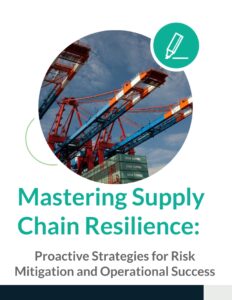Mastering Business Operations: The Critical Role of Communication, Data, and Resource Management
There are many moving parts to a business, and most of them, ironically, fall under one category, operations. Whether you’re going into business or being a part of one, it takes time, energy, and effort.
Operations are the backbone of any organization, providing structure and support for all other departments and functions. It encompasses everything from production and supply chain management to financial planning and customer service.
One of the key components of successful operations is effective communication. This includes both internal communication among employees and external communication with customers, suppliers, and stakeholders. Without clear and efficient communication channels, tasks can become delayed, errors can occur, and relationships can be strained.
Another important aspect of operations is data management. In today’s business landscape, information is constantly being generated and exchanged. It is crucial for organizations to have systems in place to collect, store, analyze, and use this data effectively. This not only helps with decision-making but also allows for continuous improvement and optimization of processes.
Continuous improvement is a fundamental principle of operations. By regularly evaluating and refining processes, organizations can increase efficiency, reduce costs, and improve overall performance. This requires a culture of continuous learning and adaptability within the organization.
Effective resource management is also essential for smooth operations. This includes managing physical resources such as equipment and inventory, as well as human resources such as employees and their skills. Proper resource management ensures that the right resources are available at the right time and in the right quantity to meet demand.
In today’s global economy, supply chain management is another critical aspect of operations. Companies must carefully manage their supply chains to ensure timely delivery of goods and services while also controlling costs. This often involves working with suppliers and partners across different countries and cultures, making effective communication and collaboration even more important.
Customer service is also a vital part of operations. Satisfied customers are crucial for the success of any business, and it is the responsibility of operations to ensure that products or services are delivered in a timely manner and meet customer expectations. This requires efficient processes for order management, delivery, and handling of any issues or complaints.
Operations may appear intricate, yet they form the cornerstone of businesses. From communication and data handling to ongoing enhancement and resource management, all operational facets collaborate to ensure seamless, successful processes that cater to customer needs and propel business expansion. With technology advancements and industry changes, organizations must vigilantly manage operations to remain competitive. Whether you’re a business owner or an employee, grasping the significance of operations is vital for overall success. Remember to prioritize effective communication, data management, continuous improvement, resource efficiency, and customer service for operational triumph. Always keep in mind that the strength of any organization lies in its operations.
Today, we’re discussing some of the common misconceptions we hear about this important topic.
1) My company doesn’t need business operations.
Let’s delve into the realm of business operations. These encompass the myriad activities a business undertakes daily, weekly, or monthly to enhance its value and generate profits, making them indispensable for your success as an entrepreneur! Operations span a wide spectrum, from production and supply chain management to customer service and financial planning. These functions serve as the backbone of your business, ensuring efficiency and sustainability. Therefore, irrespective of your business’s size or industry, the strategic management of operations plays a pivotal role in achieving success.
Begin by evaluating your business with this exercise.
- Process map your current business.
- Remain impartial with the current technology systems you use and figure out what you have vs. what you need.
- Develop your people. This is a continuous investment.
2) Operations are only important for large corporations.
While it is true that larger companies may have more complex operations due to their size and scope, operations are just as important for small and medium-sized businesses. In fact, proper operations management can be a competitive advantage for smaller companies, allowing them to be more nimble and efficient in responding to customer needs.
Additionally, even if a business is small, it still has processes in place that contribute to its operations. These can include inventory management, financial planning, and customer service. Therefore, regardless of its size, every business should prioritize operations management.
No matter if you run a start-up or an established business, you still have operations, which may be run by someone within your company or even an outside vendor. It’s important that you know what is going on to ensure it is running efficiently.
3) Operations are only about cutting costs and increasing profits.
While one of the main goals of operations is to improve efficiency and profitability, it is not the sole purpose. Effective operations also focus on providing value to customers and ensuring their satisfaction. This includes delivering high-quality products or services,
This is done by optimizing your technology, processes, and your people. Sounds simple right? Unfortunately, it’s not that cut and dry. It’s not just about boosting productivity and profits, but also improving quality and customer satisfaction.
4) Operations only involve physical processes.
While operations do involve physical processes such as manufacturing or inventory management, they also encompass intangible processes such as data management and communication. In today’s digital age, data is a valuable asset for businesses, and effective data management is necessary for smooth operations. This includes collecting, analyzing, and utilizing data to make informed decisions and improve processes.
Communication also plays a crucial role in operations, both internally with employees and externally with customers and partners. Effective communication can lead to better coordination, faster problem-solving, and improved relationships.
5) Operations are static and don’t need to be continuously improved.
Operations are not a one-time process that can be completed and then forgotten about. They require continuous improvement to adapt to changing market conditions, new technologies, and evolving customer needs. Companies that neglect operations management and fail to continuously improve their processes may fall behind their competitors.
The key is to regularly evaluate and analyze your operations, identify areas for improvement, and implement changes to enhance efficiency and effectiveness. This can help businesses stay ahead of the curve and remain competitive in their industry.
Operations are a vital part of any business and should not be overlooked or underestimated. Effective management of operations involves various facets such as communication, data management, continuous improvement, resource efficiency, and customer service. By understanding the importance of these
Just moving things around, asking people to work harder or faster, and maybe utilizing more than one piece of software isn’t going to cut it. To maximize your operations, you will need to put a little elbow grease into it.
Internal roadblocks
6) At our company, we are fortunate to have a team of certified business operations professionals who bring a wealth of expertise to the table. Their dedication and skills are invaluable assets that we are thrilled to leverage in our operations.
That’s great! We are looking forward to collaborating with these professionals. However, navigating through the intricacies of business operations isn’t just about following a set formula; it requires a deep dive into the internal workings of your business, much like diagnosing a car problem by inspecting what’s under the hood. If persistent issues continue to hinder your business growth, it may be time to seek external assistance. Consulting with experts in operations management can provide fresh perspectives and innovative solutions to optimize your business processes.
So, don’t underestimate the importance of effective operations management for your business’s success. Continuously evaluate and improve your operations to ensure efficiency, customer satisfaction, and long-term sustainability. With the right strategies in place, you can elevate your business operations and take it to new heights
7) I understand the issue at hand. I am in the process of deliberating on the best approach to resolve it.**
Let’s delve deeper into this. You likely possess a solid grasp of the problem areas and have probably explored various remedies. However, there’s a twist.
As an integral part of the internal team, your perspective may be limited to certain aspects of the issue due to your involvement in specific phases of the process. Moreover, your viewpoint is naturally influenced by biases. Given that you aren’t immersed in the day-to-day operations, comprehending the entirety of the workflow can be challenging. One valuable suggestion is to revisit the initial misinterpretation – maintaining objectivity in process mapping is crucial. Despite its complexity, this step is indispensable. Furthermore, even when tasked with documenting your workflow, elements that come naturally to you may obscure what you are truly accomplishing or overlooking.
The efficacy of your business operations is paramount, warranting meticulous attention. If you find yourself pondering whether there are more efficient methods, perhaps it’s time to seek guidance from a specialist. Aim for excellence and avoid settling for less. Take advantage of the experience and expertise of external consultants to identify areas for improvement, eliminate inefficiencies, and boost overall performance. By doing so, you can streamline your operations and drive success for your business.
So, when faced with operational challenges, strive to see the bigger picture and consider seeking outside perspectives for optimal solutions. Remember that continuous improvement is key to sustained growth and success in business operations. So, do not hesitate to seek external guidance and continuously evaluate and improve your operations to stay ahead of the curve. In doing so, you can unlock the full potential of your business and achieve long-term success. The journey may not be easy, but with a dedicated team and a growth mindset, you can conquer any operational roadblocks and steer your business toward success. So, embrace the process and never stop striving for excellence in your operations management. Let’s continue to learn, improve, and grow together.
In addition to optimizing processes and improving efficiency, effective operations management can also lead to cost savings for businesses. By identifying areas of waste and streamlining operations, companies can reduce unnecessary expenses and increase profitability. This not only benefits the company but also allows for potential cost savings to be passed on to customers, providing additional value and improving relationships.
In conclusion, business operations management is a crucial aspect of any organization that should never be neglected or considered static. Continuous improvement and effective communication
Do you still have questions?
Set up a no-obligation consultation today.






